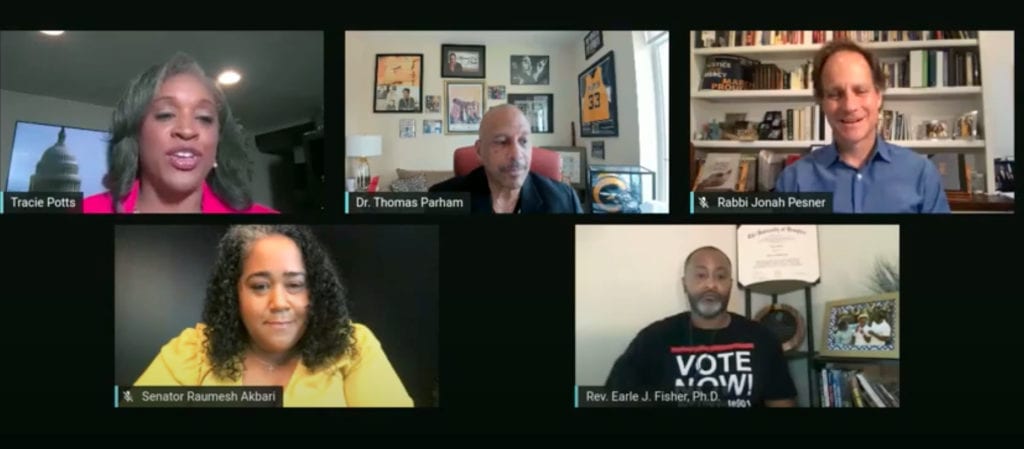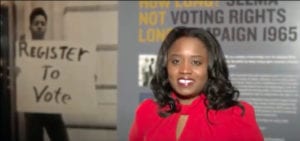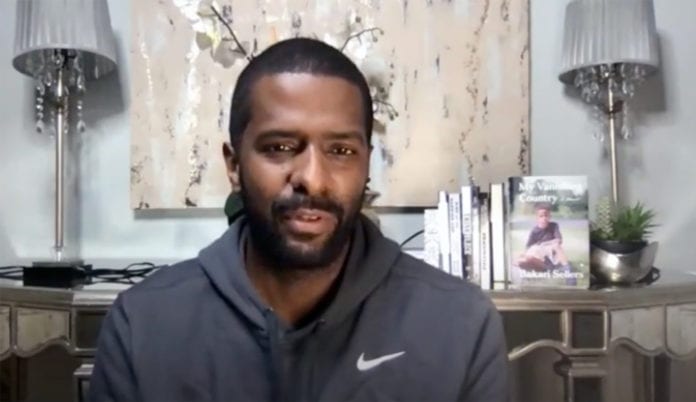“To the polls” was presented as the answer this week as members of Keepers of 306, a National Civil Rights Museum (NCRM) initiative that engages civic-minded young leaders moved to answer the question being asked by many: “Where do we go from here?”
The no-wavering answer came on Tuesday (June 30) evening during a virtual forum to raise awareness about the value of voting.
The backdrop was the quickly approaching local and national elections amid wide-ranging protests against racial injustice.
To make the case, former South Carolina state legislator, author and CNN analyst Bakari Sellers served as guest speaker.
 NBC news correspondent Tracie Potts moderated a panel that consisted of a mix of educators, activists, and politicians: Dr. Thomas Parham (California State University-Dominguez Hill), Rabbi Jonah Pesner (Religious Action Center of Reform Judaism), Rev. Dr. Earle Fisher (UpTheVote901) and Tennessee state Sen. Raumesh Akbari (D-29).
NBC news correspondent Tracie Potts moderated a panel that consisted of a mix of educators, activists, and politicians: Dr. Thomas Parham (California State University-Dominguez Hill), Rabbi Jonah Pesner (Religious Action Center of Reform Judaism), Rev. Dr. Earle Fisher (UpTheVote901) and Tennessee state Sen. Raumesh Akbari (D-29).
“2020 has brought to the forefront, many challenges of the African-American experience, be it healthcare, police brutality and an unequal judicial system, housing issues, etc.” said Trevia Chatman, chair of Keepers of 306. “Voting is our power and our voice to overcome a system of oppression that has its knee on the necks of a people.”

Chatman used the “knee on the necks” reference to shed light on recent events that have sparked national outrage and ignited world-wide protests, including the death of George Floyd, the unarmed black man who died after a white Minneapolis police officer held his knee on his neck for nearly 9 minutes.
“In the midst of the COVID crisis, in the midst of the awakening, the crying out through George Floyd and Ahmaud Arbery and Breonna Taylor, I think that people are saying that enough is enough,” Akbari said.
Despite the circumstances surrounding the untimely deaths, panelist expressed a rare, but potent chance opportunity.
“The protests that we see — not just around the state of Tennessee or the United States, but around the world — signal an opportunity for us to reinvent what our political infrastructure looks like and ultimately be,” Fisher said.
Despite the compelling case for opportunity, he also pointed to a concern of continuous engagement.
“This needs to be a movement and not a moment in history,” Potts said, concurring with Fisher.
That statement was reiterated throughout the forum, serving as a call-to-action.
“We need to come together as a human American family and collectively say, if Black lives matter, then democracy and voting matter too,” Pesner added.
Voting is one of the prevailing ways to activate change and further the movement, but historically, getting people to the polls for both local and national elections, hasn’t been an easy feat, according to the panelists.
On Aug. 6, Memphis and Shelby County residents will vote for key county and state leaders, including new school board members, state representative and state senate primaries, and primaries for the U.S. House and Senate.
In November, across the county, voters will cast ballots for the next President of the United States.
Leaders are hoping voter participation will increase since the Super Tuesday Presidential Primary election March 3.
“We have not had necessarily a voter registration problem,” said Fisher. “We have had a voter education problem, a voter engagement problem, a voter empowerment problem and a voter turnout problem.”
There were 560,138 registered voters in Shelby County in March, but only 124,892 cast ballots. That’s about 22 percent.
Voting right’s activists hope the recent court ruling, allowing all Tennessee registered voters the choice to vote by absentee ballot, will help increase turnout or, at least, won’t result in a reduction due to COVID-19 concerns.
“Part of what we have to do is instill in generations of people is that what you do in voting, there is no greater act of independent agency and empowerment than being able to turn your echo into a voice,” Parham said.
In his brief keynote address, Sellers acknowledge the importance of voting, but pointed out that it’s only one of many actions that have to take place to create change.
“Voting is great import,” he said. “But we have to demand change now.”
This change, according to Sellers, can come from a variety of actions that seed continuous political and civic engagement, while also finding ways to tell the stories of those who are oppressed.
As for getting more people to the polls, he suggested more listening and less talking from leaders, in an effort to meet people where they are.
“The reason people are not involved in the process of voting is because they haven’t seen a system that works for them, so they feel no purpose in participating,” Sellers said.
With key elections approaching in Shelby County and across the country, Keepers of 306 is hoping the “Black lives matter outcry” will positively impact voter turnout.
Its goal with the event “Where Do We Go from Here: To the Polls” was an effort to keep the issues of inequality at the forefront and the civic engagement momentum going, with hopes that it will lead to more ballots cast in the upcoming elections.



